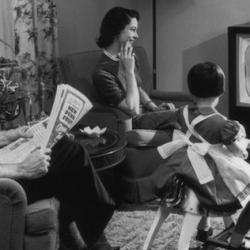The redoubtable Caitlin Flanagan has an insightful and funny review of Edward Kline’s biography of Katie Couric in the current issue of the Atlantic . Part of the review details Flanagan’s own “friendship” with the Couric of the Today show, but Flanagan characteristically goes beyond autobiography to explain Couric’s appeal. She found Today most necessary during the time when she was at home raising twin toddlers; Couric provided adult company after all the other adults had left the house:
“It is into this emotional void that the Today show’s second hour comes to the rescue, trumpets blaring: out with the first hour’s reports on war and politics and economic trends, and in come pieces on family and shopping and decorating. ‘The men are gone,’ the show seems to tell us. ‘Now we can talk about the things we love’: the exact way to sneak vegetables into the diet of a finicky toddler, the trick to putting aside a little money for a family treat, the essential components of a first-aid kid for the car – all the minutiae of running a household, presented without irony or scorn by hugely compensated media celebrities . . . .
“It is the loneliness of at-home motherhood – the loneliness for other adults, for the adult way of life, for the work clothes and schedules and employment itself – that makes the hosts of the Today show crucial. When you turn on the program, there they are: your friends. You half-listen to them, the way you half-listen to your children playing on the floor in the next room, and together the two worlds make up the whole of your enterprise: theory and practice. The host discusses shoes that are supposed to help toddlers walk more steadily, and you turn to your baby and wonder if you ought to buy him a pair. The Today show pours into the house through the kitchen-counter television or bedroom television (because the main TV, the big one, is tuned to Arthur or Clifford the Big Red Dog, and you’re half-watching those shows as well. When it is on, the television screen is no longer a barrier separating real life from TV land; the television screen is a window into another room of the house, the one where the grown-ups are.”
Like most, Flanagan thinks the Evening News with Couric a “turkey,” and explains this as Couric’s failure to read the trends in television, entertainment, politics and culture. There has been a revolution “so thoroughgoing that they don’t just provide a new answer, they change the very questions being asked.” Why have a woman on the nightly news, when “the form has become irrelevant.” Couric thought she was moving to a more powerful job by taking the evening slot, but Flanagan shrewdly notes that “the Today show – broadcast for four hours a day, a forum for interviews with many of the top newsmakers of the day, as well as for the kind of lifestyle-trend stories it pioneered and that have come to play such a big part in the nightly news – is a fare more culturally significant program.”














